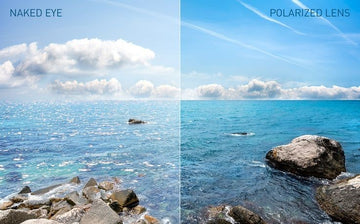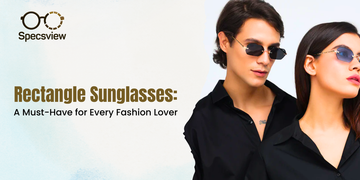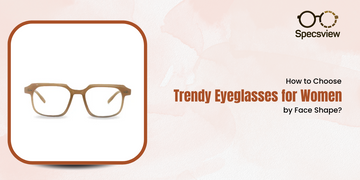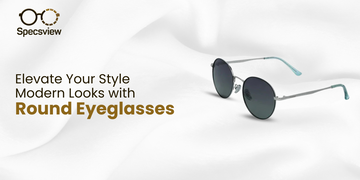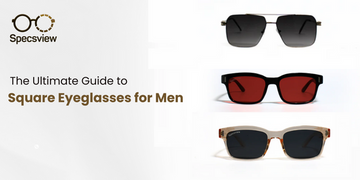Polarized sunglasses are special sunglasses that reduce glare caused by flat reflective surfaces like water, while also offering UV protection. If reflections from strong angles bother you the polarized sunglasses minimize reflections to provide better clarity, clarity, and colour perception. Read more to know more about what are polarized sunglasses with their pros and cons.

Are polarized sunglasses better than normal sunglasses?
Polarized sunglasses are specialized eyewear with lenses that reduce glare from surfaces like water and snow. While they don't offer additional UV protection compared to regular sunglasses, they greatly diminish glare, easing eye strain and improving vision in bright conditions. This makes them ideal for activities like driving and water sports. However, But it's still important to make sure your sunglasses block UV rays to keep your eyes safe. Overall, polarized sunglasses make it easier to see clearly and feel more comfortable in bright light.
What's the difference between polarized and non-polarized sunglasses?
The lenses of polarized sunglasses use an anti-glare filter that blocks the glare. Non-polarized sunglasses don't. This filter is known as a polarizer. It is a thin film that is applied outside or embedded in the lens that blocks reflections of sunrays (glare) from entering. This can provide a superior and more consistent experience for the user and reduces eye strain.

Because of this filter that polarized lenses have, they are more effective in blocking intense sunlight that has refracted and condensed from smooth shiny surfaces like snow or water. This is the main distinction over non-polarized lenses and it is solely beneficial to visual ease.
Polarized lenses aren't any better or worse in ultraviolet protection than unpolarized UV40 lenses. Polarized glasses usually cost more compared to non-polarized glasses.
Benefits of Polarized Sunglasses
- UV Protection: Polarized sunglasses, like regular ones, shield your eyes from harmful UV rays. These rays can cause eye problems like cataracts and macular degeneration. Polarized lenses have a special coating that blocks UV light, keeping your eyes safe and healthy.
- Glare Reduction: The best thing about polarized sunglasses is that they reduce glare from surfaces like water, snow, and glass. Glare happens when sunlight reflects off these surfaces, making it hard to see. Polarized lenses filter out this strong light, making your vision clearer and reducing eye strain. This is really useful when driving or doing activities outside.
- Better Vision: Polarized sunglasses also make things easier to see by improving contrast and clarity. This is great for sports and outdoor activities where you need to see clearly to stay safe. Fishermen and boaters, for example, use polarized sunglasses to see underwater without being blinded by glare.
An almost invisible filter is added to the lenses in glasses to cut down the amount of light reflection that is reflected into your eyes. The lenses that are polarized not only decrease glare but also help images appear clearer and sharper improving the clarity of vision and the comfort of wearing them..
Which is better UV Sunglasses or Polarized Sunglasses?
The purpose of UV-blocking lenses is to shield eyes from damage, however, the purpose of the polarized lenses is to reduce any glare so that you can better see and more easily. These lenses are popular for water sports fans, video gamers, and everyone who is tired of day-to-day glare.

UV protection is essential to protect your eyes from the harmful and invisible UVA and UVB Rays. Polarisation isn't a source of UV protection but instead serves as an aid to improve vision comfort by reducing the intensity of glare that is reflected from snow, water, or other surfaces. In the end, UV protection is essential. Polarisation is a plus.
Does 100% UV mean Polarized?
You might be surprised to find out the difference between the two terms UV-protection and Polarized Lenses aren't identical. Although these terms are often used together, they perform two distinct functions. Additionally, the fact that not all sunglasses provide both UV protection as well as Polarization.
Protection against UV 100% does not mean that the sunglasses are polarized. UV400 or UV40 is the term used to describe lenses that shield your eyes from the harmful wavelengths of ultraviolet light. The wavelength is between 10 to 400 nanometers. Polarisation isn't connected with UV protection. It is simply a filter added to sunglasses to minimize reflected light.
How to Check if Glasses Are Polarized?
The good thing is that it's easy to identify whether your sunglasses are polarized. Take a look at a reflective surface with and without wearing your sunglasses. You will notice a distinction in contrast and glare.
The polarized lenses make viewing the LCD screen more difficult, often appearing black or dark. To check for visibility one can examine an LCD screen, like an LCD TV or digital watch.
Embed youtube video
Another option to try before buying is to look at sunglasses that you recognize are polarized in the pair you are considering:
One lens should be placed over the polarized lens approximately 1 to 2 inches (2.5-5.1 cm) from each other. Turn the pair to 90 degrees.
When the lenses overlap the contrast will be substantially lighter than when they are not in contact. If there is no difference then the lenses aren't Polarized.
When Should I Not Wear Polarized Sunglasses?
Polarized lenses might not be the most appropriate choice for every situation. For instance, gadgets which utilize LCD displays emit a polarized beam of light. If your vehicle uses LCD displays for the basic control it is recommended to avoid wearing the use of polarized sunglasses when driving.
However, polarized lenses can be the best choice for:
- Golfers
- Skiers
- Fishermen
- Motorcyclists
- Beachgoers
Do I need Polarized Sunglasses for Driving?
Yes. Polarized sunglasses are great to drive with because they result in a safer journey. Driving during the day with polarized glasses can be done in any season. It is also possible to wear them at night as they can reduce the reflection of traffic from the brightly illuminated street lights.

Here are a few benefits of wearing polarized sunglasses when driving:
- Improved clarity and clarity of vision resulting in sharper colors and better vision
- Reflection and glare less for a more comfortable and relaxed view
- The less strain on the eyes as well as fatigue and squinting cause a relaxed, more comfortable view
- More focus and less distraction
Is Polarized Worth the Extra Money?
Polarized lenses are an excellent purchase if you spend your time in outdoors in the water such as sailing, fishing skiing, or driving. They block glare and minimize eye strain that could otherwise cause your eyes to feel tired after a day of sunshine. polarized lenses cost around 30 percent more than the equivalents without polarisation however they provide superior optical performance.
Disadvantages of Polarized Sunglasses?
1-They can change your view
Polarized sunglasses offer shielding from the sun's harmful radiation. However, the drawback to the type of sunglasses is that you might not be able to see clearly when wearing them as your eyesight might be impacted by the surroundings when you look through the lens towards an object that is not on screen.
2- Lack of UV Protection
Polarized lenses do not hinder UVA or UVB radiation. Certain polarized lenses offer UVA or UVB protection However, they are not all. Areas with significant exposure to sunlight might need to be aware of this issue.
3 Difficult to see LCD Screens
Displays with LCD screens, that are found in a cockpit emit an polarized light. So, sunglasses with polarized lenses make it difficult to read the LCDs. Pilots with polarized glasses in place may be unable to detect the glare that is reflected by the windscreen of another aircraft. It could also be an issue for certain sports where keeping track of the scores or stats displayed on huge LCD screens is crucial.
- Costs More
It's not surprising that polarized glasses cost more than normal ones. They have many amazing advantages, but for those who are looking to fulfill the function of protecting the outdoors, their price could appear to be a bit excessive. If you're not careful if the purchase doesn't fit the style of your choice, spending this significant amount of money can certainly be a heartbreaking experience.
Conclusion
Polarized sunglasses are excellent for improving your overall vision clarity. They're more expensive than regular non-polarized glasses, but they keep glare reflections from impairing your vision. For driving, or even for sports the reduction of the glare could help reduce strain on your eyes over long periods of time.
Be aware that sunglasses with polarisation can create a dimming effect on LCD screens that interfere with information displayed on digital screens. I hope you find this article helpful and that it helped you understand what are polarized sunglasses.

